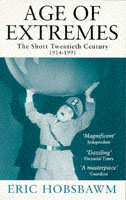
Age of Extremes
Eric Hobsbawm
484 pages, including index
published in 1994
Age of Extremes is Eric Hobsbawm's history of the 20th century, which he defines, as the subtitle The Short Twentieth Century, 1914-1991 hints at, as the period from the start of World War I to the final collapse of the USSR. He further divides this period into three parts: "the Age of Catastrophe" (1914-1947), "the Golden Age" (1947-1973) and the Age of Crisis (1973-1991). Hence, the "Age of Extremes"; in Hobsbawm's view, the 20th century went from catastrophe to utopia and ended in crisis.
Age of Extremes is not a history of the 20th century. It is more useful to think of it as a character sketch of the century, rather than as anything approaching a chronological or even thematical history. Hobsbawm assumes that his readers know what happened during the century, a not unreasonable assumption to make, even if it confused me at first, with events and themes not getting as much attention as they would in a more conventional history.
Furthermore, as Hobsbawm makes clear in his introduction to the book, this is his personal history, sublimated into the history of the 20th century, looking at the 20th century from his own point of view, without trying to be "objective" or "neutral". Hobsbawm was an old fashioned communist, critical of Moscow but still within the party. It is this background that gives Age of Extremes its ideological viewpoint from which Hobsbawm looks at the century.
Hobsbawm's definition of the 20th century is significant in this. As said, Hobsbawm starts his version of the 20th century with World War I and ends it with the final dissolution of the Soviet Union, in 1991. It therefore seems to me that he defines the 20th century as the Soviet century, the communist century. Hobsbawm's "Age of Catastrophe" then corresponds to the birth of Soviet Russia and its struggle against fascism. His "Golden Age" is the age in which the Soviet Union and the West seemed to grow towards each other, with the thriumph of social democracy in the west and a more humane communism in the USSR. Finally, the "Age of Crisis" sees the death of the Soviet dream and the seeming thriumph of neoliberal capitalism as the end of history.
Age of Extremes reads as an old man's history, disillusioned and disappointed in how the 20th century turned out. It is significant that Hobsbawm's golden age and the best he seems to be able to imagine could be achieved, still fall so far short of the ideals of communism. No wonder he seems disappointed, if even this more "realistic" ideal could not be substained. Now Age of Extremes was written in 1994, a time when it really seemed socialism was history and neoliberalism would rule the world forever. If it was written even five years later, Hobsbawm may have been more optimistic.
In some ways, he is too negative on the 20th century, especially when comparing it to the long 19th century of 1789-1914, which he here describes as a far more civilised age, standing out against the chaos of the 20th century. But if you are going to redefine the centuries willy-nilly, it takes a bit of cheek to end the 19th century at the start of World War I, when this was clearly the end result's of that long 19th century! Not to mention the eurocentrism of thinking of the 19th century as largely conflict free...
Age of Extremes then is a book that, if you are at all sensitive to strong political opinions in your non-fiction that are not yours, you are going to throw against the wall, as Bradford DeLong seems to have done. I must admit I was irritated at times too, at Hobsbawm's world weariness.
However this doesn't make this a bad book. Age of Extremes is a book written from a particular viewpoint, a book with a personality, which is both the strength and weakness of it. This is not the book to read if you want an historical overview of the 20th century, but it is the book to buy if you want to know Hobsbawm's views of it.
